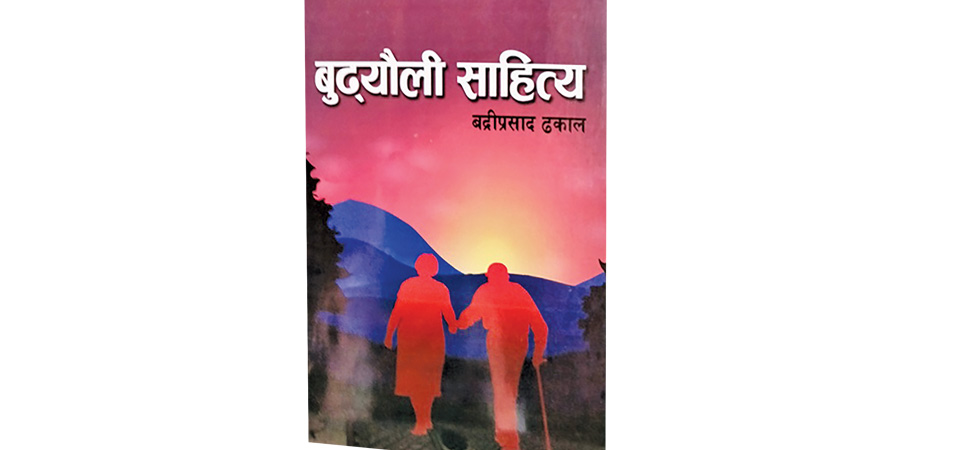Study On Aging Literature

Gandhi Raj Kafle
No matter what is a living or non-living thing, change is the rule that governs the world. But, is it easy to understand this rule? There are many philosophies, theories and thoughts which have been already built on the concept of change; but the complete interpretation is yet to be achieved.
Here, the context is aging literature in reference to the under review book entitled Budyauli Sahitya by Badri Prasad Dhakal. In fact, an old person of today was a yesteryears boy and child of past. Similarly, a child of today is also a future old person. This is a universally accepted truth of change. This is also a fact, on which this book has been prepared.
In fact, concerns over demands of senior citizens are growing. We can quote all three persons, founder of Aging Nepal Krishna Murari Gautam ‘Chatyang Master’, researcher scholar Hari Gautam and author Dhakal, who have clearly put up views in their separate prefaces to this book that being old is just a matter of change and it can’t or should not be a matter of mistreatment or neglect to senior citizens of any part of the world from societies.
But, this book’s sole aim is to highlight the issues of literature of senior citizens. Is it essential? Can’t any quality literature become subject of interest for senior citizens? Sensibly and objectively, author Dhakal argues over such questions in this book.
He makes his literary study simple dividing the book into two parts. The first part, which is the main pillar, brings various issues of aging literature into discussion and gives arguments to enhance quality of literature for senior citizens. Here, we find seven pieces of writings in the book.
The gist thing through all these seven pieces of writings as discussed by the author, however, is literary course can’t move forward if the quality pieces of writings are not delivered to senior citizens. He has sought justification over it forwarding various examples of literary themes from all pre-historic, historic and contemporary periods of time.
Old age is a ripened stage of life and it contains mature views. It is the old persons, who can churn essence of their childhood, boyhood and youth-hood experiences and can speak in details about their present day facts and emotions.
Furthermore, what we also find is the bond and attachment between generations of grandchildren and grandparents are generally harmonious. This is a proof and it is the loving behavior of senior persons which should be welcomed in society.
Dhakal has not only highlighted such facts in this book, he has also picked up instances from our sacred religious books and interpreted them to glorify the need of the quality literature for senior citizens.
The other salient feature about the first part themes is the author has attached due importance to issues like gender equality, human rights, social values, religion, culture, mythology and moral values etc while discussing the development of aging literature in this book. In fact, the importance of this part not only lies on the mainstream subjects of literature, it is so even from linguistic point of view. A table of 50 popular Nepali sayings related to old age people, page56-57, in the book is an example of this kind.
The second part of the book is a collection creative writings of litterateurs prominently with themes of aging literature. The first one in it is the essay by Nagendra Sharma, which talks on shocking incidences, which are not only unavoidable but are also tragic and prudence testing. He describes his own case, which he was compelled to bear after demise of his wife.
The other writers in this section are Dha Cha Gotame, Ramesh Bikal, Maya Thakuri, Padmabati Singh, Vijay Chalise, Rajendra Parajuli and Badri Prasad Dhakal. In fact, this is the part of creative writings and the authors in it are like the resource persons to highlight the issue of aging literature in the Nepali language for the under review book.
Author Dhakal says he has written this book to remember his father and grandmother. Indeed, his claim is valid. But, aging literature both as subject of literature and issue of society is a larger than personal issue. Dhakal has chosen such a theme and very inquisitively he has also conducted a literary study to prepare this book. In fact, such books help to narrow down generation gaps in society.
Recent News

Do not make expressions casting dout on election: EC
14 Apr, 2022
CM Bhatta says may New Year 2079 BS inspire positive thinking
14 Apr, 2022
Three new cases, 44 recoveries in 24 hours
14 Apr, 2022
689 climbers of 84 teams so far acquire permits for climbing various peaks this spring season
14 Apr, 2022
How the rising cost of living crisis is impacting Nepal
14 Apr, 2022
US military confirms an interstellar meteor collided with Earth
14 Apr, 2022
Valneva Covid vaccine approved for use in UK
14 Apr, 2022
Chair Prachanda highlights need of unity among Maoist, Communist forces
14 Apr, 2022
Ranbir Kapoor and Alia Bhatt: Bollywood toasts star couple on wedding
14 Apr, 2022
President Bhandari confers decorations (Photo Feature)
14 Apr, 2022










